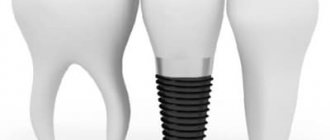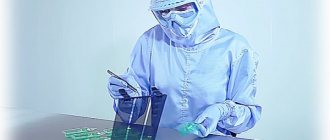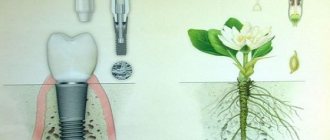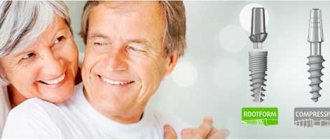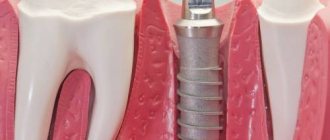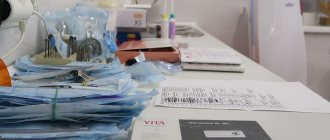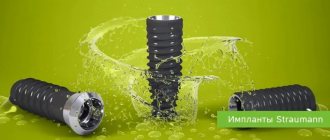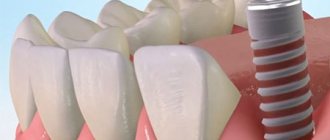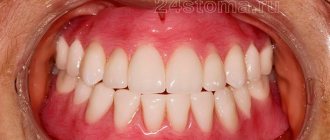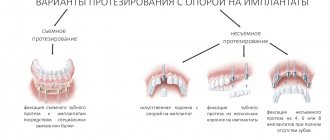Dentists often hear from patients asking them to explain to them which implants are better: Korean or Israeli. The products of manufacturers from these two countries are indeed the most in demand, since with decent quality they are in the average price range. To compare them with each other, consider the characteristics and properties of both.
Dentium implants
A high-tech product from a South Korean manufacturer. There is a premium and budget line of Dentium implants.
All Dentium series, according to experts, are characterized by:
- Root-like shape close to natural. The pin is located in the hole and evenly distributes the load on the bone. The original thread of Dentium implants contributes to the rapid stabilization of models.
- Hermetically connects to different types of abutments.
- The increased area of contact with tissue accelerates implant healing.
There is a line of mini-implants, the installation of which is minimally invasive; the designs are suitable for installing “all-on-4” or “all-on-6” systems. Dentium brand implants take root in 99% of clinical cases and are used for express implantation (installation at the time of removal). The brand produces several size ranges, so it is easy to choose the right model for each patient.
Cost of dental implants from different manufacturers
So, let's summarize all the information received into a cost summary table. We will take into account the installation of the 1st implant.
Premium implants:
| # | Manufacturer | A country | Installation cost (RUB) |
| 1 | Nobel Biocare | USA-Sweden-Switzerland | 60 000 — 80 000 |
| 2 | Biohorizons | USA | 50 000 — 60 000 |
| 3 | Bicon | USA | 45 000 — 55 000 |
| 4 | Astra Tech | Sweden | 55 000 — 75 000 |
| 5 | Straumann | Switzerland | 55 000 — 75 000 |
| 6 | Roott* | Switzerland | 35 000 — 40 000 |
| 7 | SgS | Switzerland | 40 000 — 55 000 |
| 8 | Biomed* | Switzerland | 45 000 — 50 000 |
| 9 | Xive | Germany | 45 000 — 50 000 |
| 10 | Ankylos | Germany | 50 000 — 60 000 |
| 11 | Denti System | Germany | 50 000 — 60 000 |
| 12 | Semados | Germany | 50 000 — 60 000 |
| 13 | Impro | Germany | 50 000 — 60 000 |
| 14 | Icx | Germany | 45 000 — 55 000 |
| 15 | Alpha Bio | Israel | 30 000 — 35 000 |
| 16 | M.I.S. | Israel | 30 000 — 35 000 |
| 17 | Adin | Israel | 25 000 — 30 000 |
| 18 | Ards | Israel | 30 000 — 35 000 |
| 19 | Osstem | South Korea | 35 000 — 40 000 |
| 20 | Anyridge | South Korea | 45 000 — 50 000 |
| 21 | Implantium | South Korea | 35 000 — 40 000 |
| 22 | Niko | Russia | 10 000 — 15 000 |
| 23 | Conmet | Russia | 10 000 — 15 000 |
*this method is 25-35% cheaper than the traditional one
Inno implants
Inno implants (Korea) belong to the middle price category and are suitable for both two-stage classical and one-stage dental implantation methods. The contours of the implant are hybrid: they narrow towards the cervical part, two-thirds of the length are cylindrical in shape, and the apical section is conical. The rounded tip of the Inno implant prevents rupture of the maxillary sinus membrane during sinus lifting and minimally injures the bone.
The upper part of the implant with an open thread makes installation of the structure accessible and guarantees excellent stabilization even when performing simultaneous implantation. The diameter of the pins is in the range of 3.5-6 mm, length - from 7 to 14 mm. The surface is porous, accelerating fusion with natural bone tissue.
Reviews from clinical specialists, implantologists, and patients show excellent survival rate, osseointegration and long service life of Inno implants.
Kinds
Dental implants can be divided into several types, differing in strength, design shape and installation technology:
- Root-like. The most popular of all types of implants, which are a special threaded cylinder, which is based on a titanium screw. They are used only if the patient has a large amount of bone. If there is not enough space to install a root-shaped implant, specialists either artificially increase the mass of bone tissue (sinus lift operation) or install a different type of implant.
- Lamellar. Implants that allow for maximum penetration into the jawbone, which, in turn, ensures the stability of this mechanism. Their help is used when the bone width is insufficient, that is, when it is almost impossible to install a root-shaped implant.
- Combined . They are a combination of the two previous types of dental implants and have a rather complex shape. Used in the presence of all kinds of dental defects.
- Subperiosteal implants. Designs that belong to the so-called fragile mechanisms, used when the patient has very thin bone tissue. They are placed under the gum. Despite their “openwork”, subperiosteal implants occupy a relatively large surface and, due to this, are firmly held between the bone and periosteum of the jaw.
- Endodontically stabilized . Many experts consider this type of implant to be the best, justifying their choice with a high degree of reliability and the absence of the risk of injury to the oral mucosa. This design is used when it is necessary to strengthen or lengthen the root of a tooth.
- Intramucosal . The only type of implants that does not require screwing the prosthesis into the jawbone, which is used when it is necessary to stabilize dentures.
Alpfa Bio implants
Alpha Bio implants are produced by the Israeli branch of the world famous Swiss company Nobel. And this already speaks of the seriousness and reliability of this model of implants. All Alfa Bio models are made from titanium alloy with vanadium and aluminum additives. This composition increases strength. There are models for bones of different structures, size ranges with different shapes allow you to select the right pin even in complex clinical cases.
There are options with internal and conical hexagon. The “SLA” surface shortens the healing period and ensures high-quality osseointegration.
Installation of Alpha Bio implants allows you to solve most of the patient’s problems associated with early or forced tooth loss.
Shape and features of the thread
Comparisons of implants used today are also carried out in terms of shape, size, and features of the thread on the body, neck and apical part. These parameters also influence the choice:
- Typically, two-part root-shaped rods of conical or cylindrical shape are used for installation in the jaw.
- When the hard tissue of the jaw is extremely soft, monolithic compression models are used. Thanks to a special type of thread, they compact the sparse bone during installation.
- In case of severe bone deficiency, long zygomatic and basal implants can be installed.
- Plate structures have a completely different shape and are not used for implantation today.
Ankylos implants
The premium segment is from a German manufacturer, but the cost of Ankylosis implants is close to average.
Ankylos modifications are available in the following shades:
- Red tone
– to restore units of the “smile zone”. - Yellow implants
– suitable for replacing canines, incisors, and frontal units. - Blue color implants
– restore canines and premolars. - Green
Ankylosis implants are durable structures for replacing molars or premolars, designed to withstand significant loads.
IMPORTANT!
Titanium alloy without impurities is biocompatible with tissues and does not cause negative reactions even among allergy sufferers. That's why Ankylos has excellent patient reviews. The connection between the implants and the abutment is conical.
Nobel implants
Nobel implants are the elite of the world of prosthetics; they are produced and installed only with a lifetime guarantee. The original production facilities are located in the USA and Sweden. Series are available for different bone levels and structures; Nobel implant models are suitable for implementing any surgical protocols. The installation is low-traumatic. Almost 100 percent survival rate.
The TiUnite coating accelerates osseointegration and guarantees the stability of the structures. Uniform thread allows you to install implants accurately and securely. A triangular platform is provided for the abutment. The design is ideal for installing any crowns. It is possible to install both single implants and create full-fledged dentitions for edentulous patients of the “all on 4” and “all on 6” type.
Countries producing dental implants
There are 3 price ranges for dental implants - premium, mid-price range, and budget implants.
These price ranges are very clearly distributed by country of origin. Premium implants
- USA
- Sweden
- Switzerland
- Germany
Average price range
- Israel
- South Korea
Budget implants
- Russia
- Belarus
The cost of dental implants directly affects their quality. However, this does not mean that American dental implants, which can be 2 times more expensive than Israeli ones, will be 2 times better. They will definitely be better, but the difference in quality will not be catastrophic. We'll try to figure this out below.
As you can see, there are not so many manufacturing countries, so we can describe each of them in more detail.
American dental implants
By far the leader in the global dental implant market.
Currently, American companies (including American-owned companies) produce more than half of all dental implants in the world.
The market is represented by the following companies:
Nobel Biocare
The company is part of the American corporation Danaher; implants are produced in the USA, Israel, Canada and Japan. The history of the company began in Sweden simultaneously with the advent of dental implantation as such. Currently the headquarters is located in Zurich (Switzerland). The company currently occupies 40% of the global market.
Nobel Biocare is a pioneer in the field of dental implants. The founder of the company is P.I. Brånemark developed the first implant and performed the first dental implant surgery.
The main feature of Nobel Biocare (in addition to the highest quality of product manufacturing) is the fact that in addition to the production of implants and orthodontic products, the company makes available to doctors a scanning, modeling and production system - Nobel Procera and proprietary Nobel Guide software.
It may seem that the company is not entirely American, but its owners are an American corporation and everything that the company has achieved so far owes to this corporation - its financing, support and management.
The average cost of implanting one tooth from Nobel Biocare is from 60 to 80 thousand rubles. The price is indicated without a crown. Nobel implants come with a lifetime (perpetual) guarantee.
You can read more about this company in a separate article about Nobel Biocare.
Biohorizons and Bicon implants
Despite the fact that these are American manufacturers, they do not position themselves as premium. However, they cannot be classified in the middle price range - this is a kind of lower premium range. The cost of installing implants from Biohorizons or Bicon ranges from 45 to 60 thousand rubles .
Biohorizons is a relatively young company - founded in 1994. Bicon is older - founded in 1985.
Among Biohorizons products, the Prodigy system implants have become the most popular in Russia.
They ensure high quality of manufactured products and high terms of complete engraftment (3-4 months). However, many doctors believe that a number of Israeli implants, which can be 30% - 50% cheaper, are not much inferior in quality (or even not inferior at all). In particular, products from Alpha Bio.
Swedish dental implants
Since Sweden is the country where dental implantation was first developed and performed, Swedish companies continue to play a prominent role in the dental implant market.
Astra Tech implants
This manufacturer rightfully competes with implants from Nobel. Not as popular and known as Nobel Biocare. They produce products of similar high quality at similar prices. The manufacturer provides a lifetime warranty on implants.
Advice - if, when choosing a clinic for dental implantation, you choose two that use Nobel Biocare or Astra Tech implants, then choose the one that you trust more and are more confident in the doctors. Since the implants from both companies are of very high quality, the decisive factor remains the professionalism of the doctor.
Swiss dental implants
Straumann implants
The cost is in the same price range as Nobel Biocare and Astra Tech implants. It also provides a lifetime guarantee on implants . The quality is comparable - the choice is up to the patient.
A distinctive feature of Straumann implants is the unique and patented technology of internal processing of the implant. Thanks to which the implant acquires not just a porous surface (unlike implants from other manufacturers), but a completely porous structure, which brings the implant as close as possible to the natural structure of the bone. This technology increases the speed and reliability of implantation into bone tissue.
Products from Nobel Biocare, Astra Tech and Straumann are the most expensive of all on the market. All of them are the only ones on the market that provide a lifetime warranty on their products.
ROOTT implants
This brand specializes exclusively in basal implants. Basal implants and implantation have a number of features:
- The implant is implanted into the deep (basal) layers of the bone.
- Implants are installed in 1-3 visits to the doctor.
- The load on the implant (crown) is applied almost immediately.
- The cost of implantation is 30-40% lower.
- Mistakes made during surgery are practically unavoidable and lead to removal of the implant. May have unpleasant consequences.
Implants for basal implantation have a special elongated design and a wide working area (thread).
The manufacturer provides a 10-year warranty. The products are of high quality, but they do not differ in any outstanding technologies, unlike the products of Nobel Biocare, Astra Tech, Straumann. At the moment, the basal implantation method is very actively developing and promoting on the market, especially in Russia. The positive side is the cost of implantation - from 30 to 45 thousand rubles for 1 implant.
SgS implants
A relative novelty on the Russian market. Implants from this manufacturer appeared in Russia recently, but have already proven themselves quite well. Many people mistakenly believe that this is a Swiss company. In fact, everything is much more complicated:
- SGS Dental System® Holding is registered in the Principality of Liechtenstein (Schang region).
- Implant production is based in Hungary.
- The final surface treatment of the implants takes place in Germany at the DOT Gmbh plant.
- The trademark and patent of SGS Dental System is registered in Switzerland.
So technically it is a Swiss brand with production and development in several European countries. Main features of implants:
- Medical titanium of high (Grade-4) and extremely high quality (Grade-5).
- Compliance with all international standards: ISO, FDA (US Food and Drug Administration) and CE (European Union certification).
- SBTC branded surface is known as one of the best in the world.
Biomed implants
The implants are manufactured by the Swiss company Ihde Dental AG. In Russia they are not very common. However, like other products of Swiss manufacturers, dental implants are of high quality.
This manufacturer specializes in basal implantation. They are the main competitors of the ROOTT company and offer absolutely the same conditions and features of implantation - both in terms of warranty, manufacturability and cost (30 - 45 thousand for the installation of one implant). The installation time for implants is similar - from 2 to 10 days.
Unlike ROOTT products, Biomed implants are not so actively advertised and are much less promoted. The choice remains with the patient and should be based on the degree of trust in the implantologist.
Also, the future patient should know that there are very few reviews about Biomed implants. Thus, there are very few statistics, both from patients and from dentists themselves.
German dental implants
Like everything German in general, implants from Germany are of high quality. However, Germany is not a leading country in the field of dental implants. German implants are not able to compete with famous American or Swedish manufacturers. Their main competitor is Israeli dental implants.
Although German manufacturers position themselves as the main competitors of American and Swedish manufacturers, this is not the case.
Xive implants
This is one of the leaders in the German dental implant market. The company produces a full range of dental implants, both for the classical technique and for single-stage implantation. The brand belongs to Densply Friadent.
Like all self-respecting manufacturers, implants have a specially designed thread and a proprietary patented porous surface - Friadent Plus, which:
- Accelerates the healing process by 1.5 - 2 times.
- Provides good stabilization of the implant during fusion of bone tissue and surface.
- Provide a low level of injury.
The company also supplies a full set of surgical instruments, this allows us to minimize possible complications during and after the operation.
The cost of implants with installation starts from 40 thousand rubles for one implant. The real average cost is 45 - 55 thousand rubles.
There are a lot of reviews about implants on the Internet. If you add everything up, you get good quality implantation at a slightly inflated cost.
Ankylos implants
The next most popular German brand in Russia and the most popular German brand in the world. Also owned by Densply Friadent. Good quality, about the same price. Positions itself as a more budget-friendly competitor to Nobel Biocare (sounds a little funny). They differ in the following:
- High quality workmanship.
- Relatively low cost of implantation (compared to American, Swedish or Swiss implants).
- The Friadent Plus branded coating is the same as that of Xive (however, this is already a mandatory point for all manufacturing companies).
In essence, this is a kind of analogue of Xive - it has exactly the same advantages and features. The cost is a little more expensive - from 40 thousand rubles. The average cost is 50-60 thousand rubles.
Denti System implants
Not the most famous company in Russia. There is not much information about her. Interesting for its innovative approach to development and production. We can definitely say the following:
- All products are manufactured in Germany.
- The company was founded in 1983 - quite a long time ago by the standards of the dental implant market.
- The company's products are popular among European implantologists (from Germany, Italy, Norway, England, Hungary).
- The company produces a wide range of products: Root-shaped implants
- Screw
- Acicular
- Implants for one-stage implantation - one-component
Zirconium implants are the pride of Denti System and in many ways have no analogues.
The cost of Denti System implants is similar to that of other German manufacturers. On average, implant installation costs 50-60 thousand rubles.
Semados
These implants were not included in this list by chance. Good German quality and high reliability. The brand belongs to Bego. The main features are as follows:
- Excellent medical grade-4 titanium with a proprietary rough surface, ensuring an accelerated process of osseointegration.
- German reliability and quality control.
- A wide range of products that are suitable for almost all clinical situations.
The cost of implanting Semados system implants is the same as the average price of German implants on the market - 50-60 thousand rubles per piece.
Impro
The brand belongs to the German company Helmut Knigel. This company has long established itself as an excellent manufacturer in the aerospace, defense and medical industries. Implants are relatively “young”. They are positioned as “premium quality implants at a lower price.”
Of course, they are a little inferior to premium implants, but like everything German they represent a very high quality product. Cost 50-60 thousand rubles per piece.
Icx
The next most popular brand in Russia is the German brand, while in Germany it consistently ranks among the 10 best-selling brands every year. Manufacturer: German group of companies ADM. Periodically passes them off as Swiss.
Like all popular German implants, they are distinguished by excellent quality and the use of a number of technologies that have already become mandatory for all self-respecting manufacturers:
- A proprietary microporous, hydrophilic and biocompatible surface produced by sandblasting and acid etching.
- High manufacturing precision and quality control
- Hardware and software for simulation and installation
- It has in its assortment fully ceramic abutments (gum formers), which are designed to provide the best aesthetic effect.
- There is the possibility of use for simultaneous implantation.
They differ from other German manufacturers in their slightly lower price. The company positions itself as a “socially oriented company.”
There are 2 main disadvantages of almost all German implants:
- Germany is a country with not the richest traditions in the field of dental implantation - everything that the Germans have now was studied based on the experience of other countries.
- The training of dentists and dissemination in the professional environment is not as active as that of the American or Israeli ones. This applies exclusively to Russia.
Israeli dental implants
Implants from Israeli manufacturers are extremely popular among Russian consumers. There are no official statistics, but according to different official data, they are consistently among the top three most popular and often take first place. This is explained by 2 factors:
- High quality (comparable to German)
- The price is lower than European competitors - up to 30%.
A subjective disadvantage of all Israeli manufacturers is the relatively young age of the companies: the “oldest” of them was founded in 1971 (Adin), the rest are much younger.
Alpha Bio
The most popular Israeli manufacturer among Russian consumers. Combines high quality products and relatively low cost.
For more than 25 years, the company has firmly established itself in the global market and is a leading Israeli manufacturer. The company's products have a number of advantages:
- Affordable price compared to European companies. The average cost in Russia is 30,000 - 35,000 rubles per one.
- Wide range for any clinical cases.
- Proprietary micro-rough surface NanoTecTM
- The company produces special surgical kits and develops full-fledged implantation protocols, which makes the doctor’s work easier and ensures the most predictable results.
- They are used for one-stage implantation (with immediate loading). And at the same time they provide an almost record survival rate of 99.6%.
- Just recently, Alpha Bio began to provide a lifetime warranty on its implants.
In general, the products are extremely interesting and technologically advanced. In short, these are excellent implants; many dentists consider them the best among their Israeli counterparts. Read in detail in a special article about Alpha Bio implants.
M.I.S.
Medical Implant System is the second most popular Israeli manufacturer. Was founded in 1995. There is nothing particularly outstanding or particularly bad to say about these implants. They provide good quality, the cost is even slightly lower than that of Alpha Bio products. In our opinion, they are slightly inferior in quality to analogues from Alfa Bio, but also cheaper. The average cost of installation is RUB 30,000.
Adin
As mentioned above, the company was founded in 1971, but appeared in Russia only in 2012. That is why they are not very well known among Russian consumers. The cost of production is lower than that of Alpha Bio and MIS.
Adin says it has its own research center and its own staff of scientists. The main features are as follows:
- The cost is lower than that of the main competitors.
- Proprietary Immediate Loading protocol, which allows you to install bridges on 4 or 6 specially located implants (in essence, it tries to repeat the All-on-4 technology from Nobel Biocare).
- Branded patented titanium alloy.
- Compliance with all strict international standards: CE (European certification) and FDA.
- OsseoFix surface.
- Some models come with a lifetime warranty.
It should be added that although Adin claims to meet the high standards of its products, during the company’s presence on the Russian market, certain statistics on survival rates have been collected. Namely, Adin implants showed a real survival rate of 95.5-97.5%, Alpha Bio shows a survival rate of at least 98%.
Survival rates are considered higher with the classic two-stage implantation technique. When implanting with immediate loading, the implantation percentage is 1.5-2.5% higher.
Also, implantologists do not respond very well to the instruments supplied by Adin. There is a widespread opinion in the professional environment that the tools are made in China.
Based on the facts described above, we can conclude that the Adin company is somewhat disingenuous when talking about the quality of its products being similar to Alpha Bio and MIS. Still, lower cost leaves an imprint on quality.
Ards
Production of implants began in 2005. They are the third most popular brand in Russia after Alpha Bio and MIS.
They differ from the others in a specially developed technique for drilling and implanting an implant, in which it is possible to significantly reduce the consumption of bone tissue (up to 40% savings are claimed compared to competitors).
Implants are used in almost all clinical cases, including express implantation.
In general, these are high-quality products at an adequate price (the same as Alpha Bio and Mis), the quality is similar. A serious problem is the low level of awareness of these implants among doctors in Russia, and due to this there is little clinical experience.
Implants from South Korea
South Korea, following Israel, rushed to conquer the dental implants market. Currently, local producers occupy 80% of the domestic South Korean market.
Osstem
Appeared in 1992. Osstem itself states on its website that it is the 5th manufacturer of implants in the world. Unfortunately, we cannot confirm this information in any other way. And the first in Asia (most likely this is true).
A very big plus is that the company produces a huge range of products, including related ones: instruments, abutments, allogeneic materials, etc. This allows us to provide doctors with maximum care.
In the domestic Korean market, Osstem positions itself as a manufacturer of premium implants - for the Russian consumer this means an attempt to actively compete with Alpha Bio (in principle, they do this quite well).
The conclusion regarding Osstem implants is as follows:
- High-quality products from a large company.
- Quality tends to match Israeli analogues. The main competitor is Alpha Bio, we can definitely say that Osstem cannot be of the same quality (very close), but they are definitely superior to Adin and no worse than Ards and MIS.
- The cost is usually slightly higher than Israeli competitors. On average, you will have to pay 35,000 rubles for one Osstem implant.
- The installation of these implants has a number of unusual features, which is why some implantologists tend to avoid them. Doctors who have been trained by Osstem provide a high-quality level of treatment.
Anyridge
The manufacturer, Megagen, calls them “implants of tomorrow” and considers them premium products (most likely this is true in the South Korean market). The following features can be noted:
- Lifetime warranty.
- Nanospraying on the surface - calcium ions accelerate the process of osseointegration.
- Really large assortment.
- Reduced morbidity during installation (this is the “technology of tomorrow”), however, this requires high qualifications and additional training of the doctor.
- The cost is above average (among Korean ones) - from 45,000 rubles per one (the cost is comparable even to some European manufacturers).
- Unusual thread design - many doctors call them “aggressive”, due to the fact that the thread is very, very wide (this is unusual for some Russian implantologists).
- Those doctors who use it note the advantages of this thread in the form of extremely high primary stabilization (the implant will not fall out), this is really a plus.
- Very high installation speed. In this regard, Anyridge breaks records - it is theoretically possible to place an implant in 60 seconds. To be fair, it is worth saying that this is far from the most important thing in dental implantation.
- Most often, these implants are used for express implantation (based on the advantages you described, this may be understandable).
The conclusion about these implants is the following: an interesting, high-tech and fairly high-quality product that can be installed, but only by a qualified doctor, and don’t forget about their higher cost.
Most recently, the company released AnyOne implants. They have become widespread in the USA and South Korea. The reviews are extremely positive and note that they are more interesting than Anyridge. In Russia this is still a curiosity.
Implantium
They are produced by the company Dentium - therefore, when they say Dentium, they mean Implantium. The first products began to be produced in 2000, and appeared on the Russian market in 2007.
These implants are used exclusively in a two-stage implantation technique. There is nothing bad to say about these implants, but nothing supernatural either. Implantologists speak about them in exactly the same way - they indicate that the implants are good, but nothing special. Judging by the reviews, patients also have no particular complaints.
Conclusion: normal quality, however, in our opinion, the price is slightly overpriced.
Russian dental implants
Niko
They are produced by the Rusimplant and were previously known under the name “Liko”. Thus, if you hear Rusimplant, Niko, Niko, Liko - this is the same thing.
The implants were developed with the participation of German specialists and are produced using German equipment (this is true). Manufacturers are even talking about a joint Russian-German venture. Their main advantage is their low cost - 2 times cheaper than Israeli and Korean ones, and 4 times cheaper than European and American ones. At their core, they are a copy of foreign analogues (many doctors “recognize” them as implants from Astra Tech), but tailored to the Russian mentality and consumers.
In principle, these implants are more than worth their price. They are cheap, they take root, they are installed normally (doctors do not experience any particular difficulties). Based on available statistics, these implants work well in restoring chewing teeth and those teeth that are not visible. There is a convenient shape (copied from foreign analogues) and a micro-rough surface made using German technologies. Restoring teeth in the smile area is not their strong point; they cannot provide the same level of aesthetics as their foreign competitors.
The range is wide and allows them to be used both with a one-stage technique and with a classic two-stage implantation.
The conclusion about these implants is the following: they can be used on a limited budget and when restoring chewing teeth (those that are not visible), when restoring front teeth, it is better to spend money on higher quality foreign analogues. You shouldn’t be too afraid of them (like some of our compatriots) - for the money it’s very good.
Conmet
Another Russian manufacturer. He tries, works, improves his products. Just as cheap, there are the same problems. You can use it, but be careful.
Straumann implants
Swiss dental brand – premium category. The company creates not only current models of dental implants, but also components for discontinued versions. The policy of the Strauman brand is to help every patient who may need to replace elements on long-established structures.
A series of implants with different neck heights, self-tapping threads and a conical tip are in demand (this structure guarantees accelerated stabilization). Strauman implant models are created from a hypoallergenic titanium alloy with a 15% addition of zirconium. The nanostructured surface of the implant means increased hydrophilicity and rapid engraftment.
IMPORTANT!
Straumann implants are suitable for patients with relative contraindications – diabetes, osteoporosis, and consequences of other diseases.
Rating of the best implants - TOP 10 models
If you are deciding which dental implants are best to choose in terms of quality and successful experience in practice (and not just price), then the rating will be distributed as follows - see the table:
| Brand/company | Level of marginal bone subsidence | Surface Features | Survival rate |
| Nobel Biocare | There is no resorption in the first 5 years, but in 10 years the level decreases by 0.3 mm | Hydrophilic TiUnit active surface coated with phosphorus ions | Up to 99.3% (10 year perspective) |
| Straumann | Subsidence of 0.45 mm over 5 years | SLActive surface with hydrophilic properties | 97-99.2% (10 years) |
| Astra Tech | Maximum subsidence over 5 years is about 0.3 mm | Active hydrophilic OsseoSpeed surface with fluoride ions. | 94-100% (10 years) |
| Ankylos | Up to 0.6 mm in 3 years | Volumetric surface with a large number of micropores FRIADENT Plus | 94-100% (8 years) |
| XiVE | No data available | 95-99% (5 years) | |
| M.I.S. | 0.7 mm in 1 year | SLA – rough and microporous surface | 97.3% (5 years) |
| Alpha Bio | No data available | Microporous coating NanoTec | 98.3% (5 years) |
| Osstem | Up to 0.8 mm in 5 years | Surface with hydrophilic properties | 96-98% (5 years) |
| Implantium | On average, resorption is 0.45 mm over 1 year | Classic SLA surface (rough) | 98% (5 years) |
| Biomed | No data available | For solid ones - smooth with antimicrobial coating | 96-98% (5 years) |

